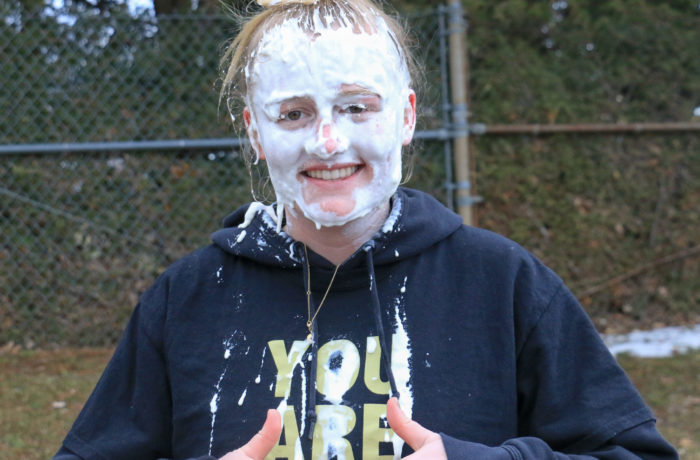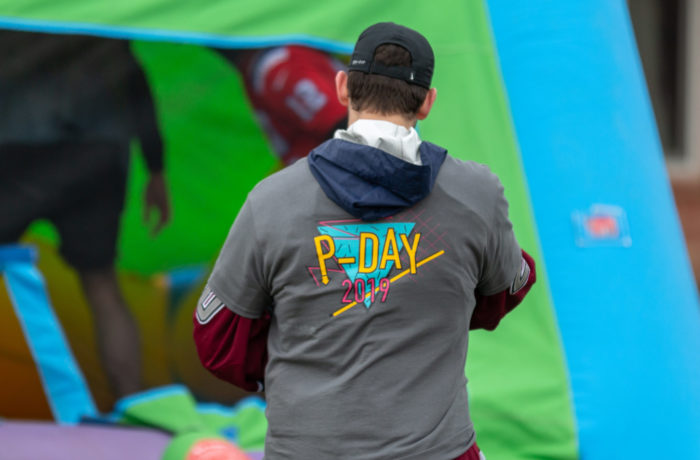By Katherine Martin
Executive Editor
Jasmine Powell ‘18 entered her college career sober. Although she frequented parties at the threes, she refrained from consuming alcohol, smoking weed, and taking the ecstasy she once used regularly. Still living in Burlington, Jasmine works for the Howard Center as a behavioral interventionist with kids. She explained that she believes it’s a part of her recovery to be of service to others and sometimes all that looks like is being open about her story.

When were you first were introduced to alcohol and drugs?
I first tried smoking and drinking casually with friends in high school, but I quickly picked it up regularly after the first feelings of being high and drunk. After doing that for a little, it stopped being as exciting so I began experimenting with more drugs. I tried ecstasy for the first time at a party then started using it at least every weekend for awhile.
What do you think led to you abusing drugs and alcohol?
Most of my family on both sides are either recovering or active alcoholics/addicts. Wanting to rebel against my parents and experience things I wasn’t used to was a factor. I had never been exposed to casual drinking so I didn’t understand the idea of consuming alcohol for any other reason than to get drunk. I was also depressed and struggled to cope with even the smallest inconveniences. I think that led me to seeking comfort elsewhere, which I first found in smoking and drinking, then quickly in other drugs, like ecstasy.
What were your steps to getting sober? Did you seek out help yourself? Relapse?
I always knew the way I was using was a problem or at least wasn’t normal. When I was using, I never sought out help for myself. I got sent away when I was sixteen to a Wilderness Therapy Program called WinGate in Utah. They were therapy programs and not strictly rehab centers. What it came down to at first was that I was so miserable that I really just wanted to be happy and was willing to give up using if that’s what it would take. I have stayed sober since then and kept my same sobriety date and I know that I’m lucky to be able to say that.
Going to college recovered, were you more aware of the readily available drugs on campus? Or do you feel they were only there if you seeked them out?
I didn’t really know what to expect going into it to be honest. I decided to do GREAT housing [Alcohol and Drug Free living communities] my first year just to play it safe and after I got more of a feel for what campus was like I moved out of that.
When I came to St Mike’s I made sure to tell everyone I was sober when I met them just to hold myself accountable and be open about it. It turned out that almost everyone I talked to about it was super supportive and nonjudgmental. A lot of people were even protective of my sobriety. I never shied away from the party scene at school because I’m super social and have fun going out, I felt uncomfortable when other people’s using or mindset was problematic. An example of a problematic mindset would be the people who use drugs or drinking to achieve relief in some sort of way or when people think they have to drink to be social or go out. That’s a really common mindset, but it’s just not true. I’d challenge anyone reading this to go out on campus without drinking one night and you’ll see it can be just as fun.
What was it like being sober in a college environment?
The actual drugs and alcohol were never a problem, but sometimes the lifestyle of doing that was hard to be around. Since I’m not using, I don’t want to sit in a suite for days at a time smoking and playing video games so I think in some ways it limits who you can spend your time with. I have nothing against anyone’s lifestyle, but if people were doing that, our interests just didn’t align. I think it’s hard for a lot of people who are sober to even be around drugs and alcohol, but since I got sober so young and was sober for some time before starting college it just didn’t bother me.
Something that did come up that wasn’t expected though was people who were struggling or starting to struggle reaching out to me a lot. The thing is, I can’t get anyone sober, no one can. If you want to get sober you have to do the work yourself.
What sort of things kept you motivated to staying sober?
What it comes down to is that my worst day sober is infinitely better than my best day when I was out using. I have a life and interests and an actual personality and values now that I never had when I was using. I really enjoy my life and I did the work to get where I am today and that’s not something I’m willing to throw away.
Do you think drug abuse/alcoholism are quiet addictions? Do you think St. Michael’s students struggle?
There are some people who can be full blown addicts and still be functional, but I think that’s rare. I also think although it may be obvious you’re struggling with using habits, the underlying struggle is often quiet. I was drinking handles and throwing up in the toilet at every party, but that’s not what it looks like for everyone. Sometimes it’s having one or two too many and then being the funny drunk girl on campus.
I don’t think depression and suicide amongst addicts is talked about enough. For me, and most other addicts, in recovery or not, depression and addiction go hand in hand. Sometimes people start using heavily because they’re depressed and sometimes people get depressed because they start using heavily, either way both are often present.
I definitely know St Mikes kids struggle. Some struggle to balance partying and school, some struggle with not blacking out, some struggle with feeling pressure to drink or use. Either way, there are definitely kids on campus in recovery, in full blown addiction, or just trying to manage their lifestyles.
What do you wish you had known/someone had told you before it got to the point of addiction?
First of all, there are ways to get sober. It’s never too early or too late to get sober. I got sober at 16, others get sober at 60. I think that everyone has to reach their own bottom before being willing to actually put the work in and get sober.
My first addiction started way before I ever drank or used and that was self harm, but I didn’t realize it was an addiction and part of my recovery until getting and staying sober. I feel incredibly grateful that both my parents are sober and had the resources to send me away when I was so young. That’s not the case for most people and a lot of people really start experimenting for the first time in college.
Addiction isn’t about how many beers you drink in one night or how many pills you can pop before passing out, it’s about limits. As an alcoholic, I may know that my limit before blacking out is 7 beers, but once I start drinking I can’t stop or limit myself. In my head that may look like justifications (‘who cares it’s the weekend’ or ‘I don’t have much homework tomorrow so I’ll just have another then another then another’ etc). I guess my advice is to be honest with yourself, and if you think you might have a problem, reach out.
There are plenty of professors, advisors, faculty, website, therapists, and friends who can at least point you in the right direction.
What do you think about students who drink specifically to black out or get hammered?
I think it’s hard to talk about college kids drinking to get blackout or drunk. It’s the culture of going out at schools. It’s also how a lot of people define an alcoholic. I think there’s a difference between students who drink to be tipsy or drunk on purpose and students who consistently drink with the goal of getting blackout. It really comes down to each individual though, a lot of people graduate after partying hard all 4 years then slow down a lot and are totally fine.
Another problem that I see happen is when people say something about having a problem friends joke it off or excuse it by saying it’s just the college drinking culture,. people should take addiction more seriously.
If your friend thinks they have a drinking problem, look up a meeting and drive them, or go with them to make a Bergeron appointment, or sit with them while they call their parents to tell them.
It’s not cute or funny or a personality trait to get blackout drunk every weekend.


